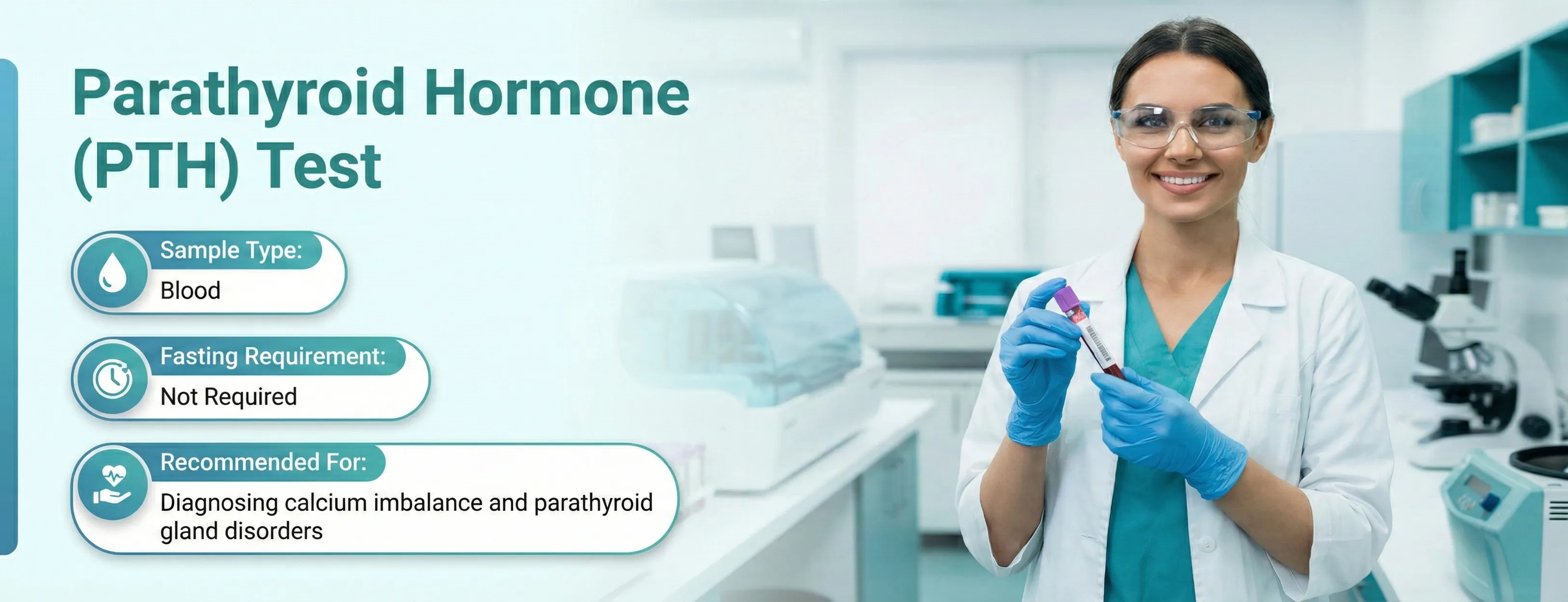210+ orders placed in your location
100% NABL & ISO Certified Lab • 100% Accurate Reports
Parathyroid Hormone (PTH) Test
Intact Parathyroid Hormone Test, Parathormone Test, PTH Blood Test, Intact PTH
- SummaryThe Parathyroid Hormone (PTH) Test measures the level of PTH in the blood, which helps regulate calcium and phosphate balance in the body. It is commonly used to evaluate unexplained calcium imbalances or monitor parathyroid gland function in conditions like hyperparathyroidism. The test requires a blood sample, does not require fasting, and is suitable for all age groups and genders as advised by a doctor.Read more
- Reports Within19 HrsView Sample Report100% NABL & ISO Certified Labs
- SampleBlood
- AgeAll Age Group
- GenderMale and Female
- FastingNot Required
PharmEasy Promises
Know More About The Test
A quick info on Parathyroid Hormone (PTH) Test
Overview
Parathyroid hormone, abbreviated as PTH, is also known as the life-saving hormone. The hormone regulates calcium balance in the body and is secreted by four parathyroid glands surrounding the thyroid gland. Calcium is necessary for the formation of teeth, bones, clotting, the release of hormones and the maintenance of the nervous system. The hormone targets the kidneys, intestines and bones. The primary purpose of the parathyroid hormone is to increase calcium levels. It is done via renal calcium resorption and decreasing phosphorus levels.
There are two possible scenarios:
- A low blood calcium level stimulates the parathyroid gland to release PTH in the blood. It results in a normal calcium level.
- A high blood calcium level causes negative feedback and parathyroid glands stop releasing PTH. It will cause a normal blood calcium level.
Any abnormalities in PTH can be detected using the PTH blood test. The test is compatible for both adults and children, irrespective of gender.
Your doctor will prescribe a PTH blood test if calcium or phosphorus abnormalities are suspected. Symptoms like increased thirst, nausea, vomiting, fatigue and abdominal pains state this fact. A person needs to fast for eight to twelve hours. They can consume water during this period before the PTH test. To summarise, the primary functions of PTH are:
- To regulate blood calcium levels 24x7.
- Phosphate regulation in the body.
- Synthesising active form of vitamin D.
India suffers from an over-functioning parathyroid gland, vitamin D deficiency and other bone disorders at a large scale due to lack of awareness and negligence towards getting routine calcium screening examinations. An over functioning parathyroid gland means hyperparathyroidism. It can result in kidney stones, depression, bone fractures, etc. Thus, getting examined routinely for calcium and parathyroid hormone is an intelligent decision towards leading a healthier lifestyle.
Risk Assessment
Hyperparathyroidism, Hypoparathyroidism, Osteoporosis, Hypocalcemic tetany
What does this test detect?
The PTH blood test solely accounts for the PTH levels in the bloodstream. It is analysed based on a blood sample collected by the healthcare professional. The rise or fall of these levels has numerous interpretations. The PTH blood test is applicable for males and females, both adults and children.
The PTH test can help assess the following:
- Primary hyperparathyroidism
- Secondary hyperparathyroidism
- Tertiary hyperparathyroidism
- Tumour or cancer of the parathyroid gland
- Hypoparathyroidism
- Osteoporosis
- Hypocalcemic Tetany
- The definite cause behind high/low calcium levels
- Chronic renal failure
Indications for PTH Test
A PTH blood test is prescribed to those experiencing symptoms of impaired calcium levels:
Symptoms of hypercalcemia or high calcium levels:
- Increased urination
- Fatigue, headache and body aches
- Loss of appetite and constipation
- Nausea and vomiting
- Depression and lethargy
- Weakness and cramps
Symptoms of hypocalcemia or low calcium levels:
- Numbness and tingling sensations in the extremities
- Confusion and memory loss episodes
- Irregular heartbeat
- Increased occurrence of bone fractures
- Brittle nails
- Depression and hallucinations
How frequently should you take this test?
A basal metabolic panel can detect abnormal calcium levels in the blood. With the help of these findings, your doctor can prescribe a follow-up PTH blood test to identify the cause behind the rise or fall of calcium levels.
Thus, a basal metabolic panel (BMP) done once a year will guide you towards your next steps. Otherwise, signs and symptoms like muscle spasms and cramps, bone pains and fractures or abdominal distress can also raise an issue with the parathyroid gland. If you are hypocalcemic, you should take appropriate medication. Upon reaching a stable calcium concentration in the blood, get monitored every three to six months.
Test Preparation
Before the Test
The procedure for the PTH test requires overnight or eight to twelve hours of fasting. Here you cannot consume any solid food substances but are allowed to drink water. Also, avoid intake of particular medications, like:
- Calcium supplements, as they increase blood calcium levels
- Thiazide diuretics
- Vitamin D
- Thyroxine
- Consumption of excess milk or milk products before the test
During the Test
A nurse or sample collector will use your arm's vein to collect the blood sample. Preferably, wear a short sleeve for convenience during sample collection.
After the Test
When done hygienically and according to protocol, the intact PTH test procedure poses no serious threats to an individual. There might be a slight soreness due to needle insertion and lightheadedness.
Parameters
The PTH test only measures the level of parathyroid hormone in the blood. Although, it is also ordered to monitor chronic kidney diseases. The results of the PTH test must lie within the normal range to confirm a healthy functioning parathyroid gland. The PTH test accounts for the concerning signs and symptoms of hyperparathyroidism and hypoparathyroidism.
Causes of Hyperparathyroidism | Causes of Hypoparathyroidism |
|
|
Ranges
|
Parathyroid hormone |
Conventional unit in pg/mL |
SI Unit in ng/L |
|---|---|---|
|
Intact (whole) |
10-65 pg/mL |
10-65 ng/L |
|
N terminal |
8-24 pg/mL |
8-24 ng/L |
|
C terminal |
50-330 pg/mL |
50-330 ng/L |
Reference: Pagana KD, Pagana TJ, Pagana TN. Mosby’s Diagnostic & Laboratory Test Reference. 14th ed. St. Louis, Mo: Elsevier; 2019.
Pregnancy and breastfeeding are normal physiological conditions that increase parathyroid hormone levels in the blood.
The normal values and reference ranges of the test may vary from lab to lab. Please refer to the ranges mentioned in the report and consult a doctor to understand the interpretation of lab reports.
Test Result Interpretation
The results of the PTH test can help yield information about abnormal levels of PTH in women, men and children.
According to the American Board of Internal Medicine, normal values for PTH should lie between 10-65 picograms per millilitre (pg/mL). The test result will interpret whether you have hyperparathyroidism or hypoparathyroidism. Your PTH levels will be interpreted, keeping the calcium blood levels in mind.
The possible interpretations of PTH levels in the body are:
- Hyperparathyroidism: This is due to elevated synthesis and release of PTH in blood.
- Primary hyperparathyroidism
- Secondary hyperparathyroidism
- Tertiary hyperparathyroidism
Correlation between PTH and Calcium:
|
Primary hyperparathyroidism |
Secondary hyperparathyroidism |
Tertiary hyperparathyroidism |
|---|---|---|
It is a condition of elevated parathormone and calcium levels. |
It is a condition of elevated PTH levels secondary to constant low calcium levels in the blood. |
It is a condition of continual secretion of PTH in response to a prolonged hypocalcemic stimulus. |
Features:
|
Primary hyperparathyroidism |
Secondary hyperparathyroidism |
Tertiary hyperparathyroidism |
|---|---|---|
|
|
|
- The laboratory findings, in addition to increased PTH levels, are:
- Hypercalcemia in primary hyperparathyroidism.
- Increased serum alkaline phosphatase enzyme (ALP).
- Decreased phosphorus levels, known as hypophosphatemia.
- Vitamin D deficiency.
- Hypoparathyroidism: There are lower than normal secretions of PTH in the blood.
Risks and Limitations
The PTH blood test is a common blood test with a very low risk of complications. Seek medical advice right away if you notice-
- Excessive bleeding following the needle insertion.
- Discomfort or swelling at the insertion site.
Limitation of the test
- Negative impact on the outcome of the test due to equipment or human errors.
- Wrong understanding of the markers.
Was This Test Information Helpful?
Please rate your experience
References
People Also Ask
What does a high PTH level mean?
What is a PTH blood test for?
What happens if PTH is too high?
What is the normal range for a PTH blood test?
Have any doubts? Ask us.
Ask us anything about the Parathyroid Hormone (PTH) Test to understand it better
We provide trusted, expert-curated health content to support better awareness,prevention, and care.
Backed by experienced doctors, medical experts, and strict editorial standards.


